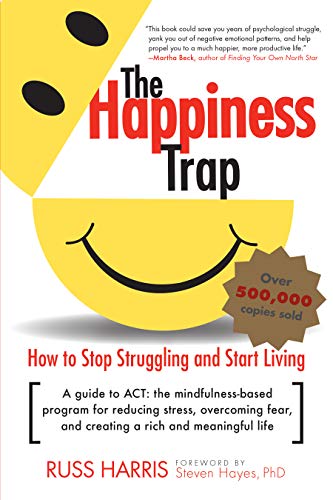
About
Title: The Happiness Trap Authors: Russ Harris, Steven Hayes Category:books Number of Highlights: 18 Date: 2022-12-18 Last Highlighted: 2022-12-18
Highlights
So here is the happiness trap in a nutshell: to find happiness, we try to avoid or get rid of bad feelings, but the harder we try, the more bad feelings we create. (539)
Psychological flexibility is the ability to adapt to a situation with awareness, openness, and focus and to take effective action, guided by your values. (636)
Tags:act
Thoughts = words inside our heads Images = pictures inside our heads Sensations = feelings inside our bodies. (682)
Tags:favorite,perception,act
In ACT, our main interest in a thought is not whether it’s true or false, but whether it’s helpful; that is, if we pay attention to this thought, will it help us create the life we want? (691)
Tags:perception,act
All too often we react to our thoughts as if they are the absolute truth or as if we must give them all our attention. The psychological jargon for this reaction is “fusion.” (705)
Once you’ve acknowledged a story, that’s it—just let it be. You don’t have to challenge it or push it away, nor do you have to give it much attention. Simply let it come and go as it pleases, while you channel your energy into doing something you value. (797)
Tags:act
Anytime you’re feeling stressed, anxious, or depressed, ask yourself, “What story is my mind telling me now?” Then once you’ve identified it, defuse it. (809)
The thinking self is responsible for thinking, in the broadest sense of the word; it produces all our thoughts, judgments, images, fantasies, and memories, and it is commonly called “the mind.” The observing self is responsible for awareness, attention, and focus. It can observe thoughts, images, memories, etc., but it cannot produce them. It has no commonly used word to describe it. (1633)
Tags:act
The four basic steps of expansion are: observe your feelings, breathe into them, make room for them, and allow them to be there. (1679)
Tags:act
A = Accept your thoughts and feelings. C = Connect with your values. T = Take effective action. (1940)
Tags:act
You can think of the observing self as being like the sky, while thoughts and feelings are like the weather—constantly changing. (2604)
Tags:act
psychological flexibility has two major components: (1) the ability to adapt to a situation with openness, awareness, and focus, and (2) the ability to take effective action, guided by values. (2640)
Tags:act
A value is a direction we desire to keep moving in, an ongoing process that never reaches an end. (2688)
As the great philosopher Friedrich Nietzsche once said, “He who has a why to live for, can bear almost any how.” (2711)
Tags:act,determination
We who lived in concentration camps can remember the men who walked through the huts comforting others, giving away their last piece of bread. They may have been few in number, but they offer sufficient proof that everything can be taken from a man but one thing: the last of human freedoms—to choose one’s attitude in any given set of circumstances, to choose one’s own way. (2735)
Note: A stoic lesson from Mans Search of Meaning
Sir Winston Churchill: “Success is not final. Failure is not fatal. It is the courage to continue that counts.” (3474)
Tags:success,perception,favorite
As Winston Churchill put it: “A pessimist sees the difficulty in every opportunity; an optimist sees the opportunity in every difficulty.” (3541)
you’ve probably come up against one or more components of FEAR: Fusion. Excessive expectations. Avoidance of discomfort. Remoteness from values. (3601)
Tags:act